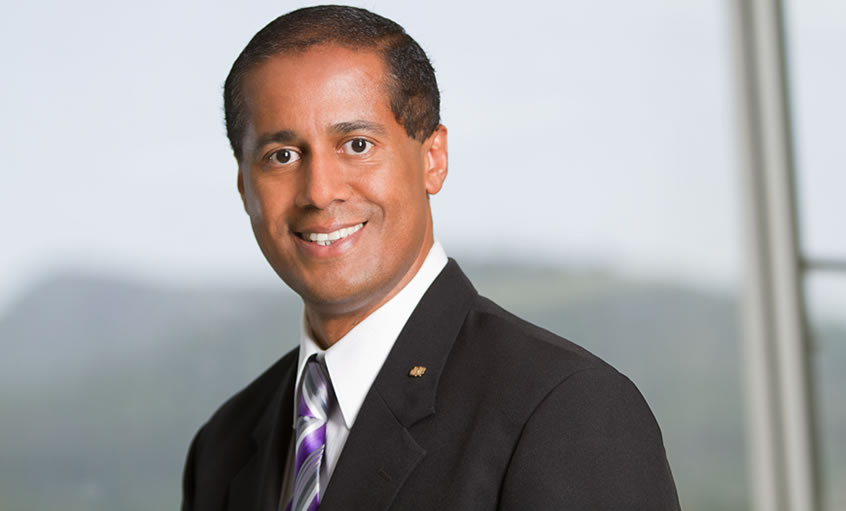Republic Financial Holdings Limited (RFHL) is the registered owner of all of the Banks in the Republic Group – Republic Bank Limited, Republic Bank (Guyana) Limited, Republic Bank (Barbados) Limited, Republic Bank (Grenada) Limited, Republic Bank (St Maarten) N.V., Republic Bank (EC) Limited, Republic Bank ( Anguilla) Limited, Republic Bank (Suriname) N.V, Republic Bank (Cayman) Limited, Republic Bank (Ghana) Plc., Republic Bank (BVI), Cayman National Corporation as well as Republic Wealth Management Limited and other subsidiaries.
In keeping with international best practice, this holding company was formed with the aim of offering increased operational efficiencies and optimum management of the Group; ultimately leading to greater value for our shareholders and clients while enabling greater strategic focus and diversification.
Leadership

Vincent A. Pereira, Chairman
Vincent A. Pereira is an accomplished petroleum engineer with more than 35 years in the energy sector, bringing extensive leadership and technical expertise to his role as Chairman of RFHL. His career includes significant achievements in both Trinidad and Tobago and the United States, with a strong background in operational excellence and strategic development.
Mr. Pereira is a former President of BHP Trinidad and Tobago, where he was instrumental in achieving value-based growth, overseeing major offshore developments, and spearheading exploration efforts in deepwater frontier basins. His influence extends to industry governance, having served as a Director of the Energy Chamber of Trinidad and Tobago and as a Governor on the Board of the National Energy Skills Centre.
Education and Credentials
Bachelor of Science in Chemistry, University of Guelph
Master of Business Administration (MBA), Houston Baptist University
Diploma in Petroleum Engineering, University of the West Indies

Nigel M. Baptiste, Group President and Chief Executive Officer
Nigel M. Baptiste has dedicated over 30 years to the banking sector, contributing to Republic Bank Limited’s growth and innovation. Appointed in 2016, Mr. Baptiste’s tenure as Group President and CEO is marked by his commitment to strengthening Republic’s leadership position in the Caribbean financial market. His extensive experience encompasses key roles, including Managing Director of Republic Bank Limited and Republic Bank (Guyana) Limited and serving as General Manager of Human Resources.
Mr. Baptiste’s strategic vision has positioned RFHL for sustainable growth and market responsiveness. He also champions operational excellence across multiple subsidiaries, aligning the group’s strategic initiatives with economic development goals across the Caribbean.
Education and Credentials
Bachelor of Science (Honours) in Economics, University of the West Indies
Master of Science in Economics, University of the West Indies
Advanced Management Program, Harvard Business School
Diploma with Distinction, ABA Stonier Graduate School of Banking
Associate of the Chartered Institute of Bankers

Republic Financial Holdings Is A Driving Force And Agency For Change
“The Republic Group has been competitive in the pursuit of service excellence and nation-building for more than 186 years.”
Working closely with many to help build successful people and sustainable societies, the Group strives to go beyond the boundary as the one true indigenous team that has stood the test of time in efficiently delivering service to our clients, stakeholders, and communities in the Caribbean, South America and Ghana.
In every field, every time we bat, we stride forward confidently with eyes fixed on hitting our goals. As we focus on unlocking the truest potential of our People, Planet, Progress and Communities, we are determined, compassionate and strategic in our approach in seizing
opportunities and facing challenges head on.
Unified in this purpose, the Republic Group continues to be a driving force and agency for change in the markets we serve, working together as one to bring our stakeholders and our people, leading-edge solutions to fulfil their needs and achieve their goals.
As a team, we will continue to cheer for, and empower, many in bringing out their best. As a Group, we will endeavour to create sustainability, promote equity, and nurture the talents of our people and communities wherever we channel our resources.
Republic Financial Holdings Limited (RFHL) recorded a profit attributable to equity holders of the parent of $1.75 billion for the year ended September 30, 2023, an increase of $224.0 million or 14.7 percent over the profit of $1.53 billion reported in the prior year.
These results are a combination of the returns from the Group’s advances and investment portfolios, and reduced credit loss expenses.
Based on these results, the Board of Directors declared a final dividend of $4.10 per share for the year ended September 30, 2023. When combined with the interim dividend of $1.10 per share, this brings the total dividend for the year to $5.20 per share, an increase of $0.70 or 15.6 percent over the amount declared for 2022. At a share price of $121.02 as at September 30, 2023, this results in a dividend yield of 4.3 percent on an RFHL share.
The Group earned net interest income of $4.7 billion for year ended September 30, 2023, an increase of $526 million or 12.7 percent above the prior year.
Average total assets increased by $1.9 billion or 1.7 percent in the fiscal, with the net interest margin increasing from 3.76 percent in 2022 to 4.17 percent in 2023.
• In Trinidad and Tobago (T&T), net interest income grew by $142 million, being the net impact of increases in interest income and interest expense of $210 million and $68 million respectively. The increase in interest income was generated primarily from the growth in the advances portfolio, coupled with higher interest rates on United States dollars (USD) denominated investments. The $68 million increase in interest expense stemmed from growth in the deposit portfolio and higher interest rates on the US$150 million floating rate debt.
* In Barbados, net interest income grew by $5 million, the net result of a $3 million increase in interest income and a $2 million decline in interest expense. The $5 million growth in interest income was the result of increased portfolios for advances and investment securities, while the decreased interest expense was due to a decline in the deposit portfolio of Republic Bank (Barbados) Limited.
• The Cayman Islands recorded increased net interest income of $247 million, the net effect of increases in interest income of $352 million and $105 million in interest expense. The increases were the result of increased yields on USD investment securities and customer deposits in the Cayman Islands market.
• The Eastern Caribbean (EC) recorded growth in net interest income by $74 million due to increases in interest income and interest expense by $83 million and $9 million respectively. This resulted from increased portfolio balances for advances and customer deposits in the EC islands, while interest rates remained fairly constant.
• In Suriname, the increase of $40 million was the net effect of an increase in interest income of $37 million and a $3 million decline in interest expense. The increase in interest income was due to growth in the advances and investment portfolios, while the decreased interest expense was a result of a reduction in deposit rates.
• In Ghana, the $40 million decrease in net interest income resulted from a decline in interest income of $5 million and increased interest expense of $35 million. This decline was mainly due to a reduction in average interest rates for advances and the depreciation in the Cedi exchange rate during the year. The increased interest expense resulted from increased interest rates in addition to an increased customer deposit portfolio.
• In the British Virgin Islands (BVI), the increase of $9 million in net interest income was due to increases in interest income and interest expense by $20 million and $11 million respectively. Increased yields on advances, investments and customer deposits accounted for the increased income and expense.
The increase in profitability in 2023 is reflected in the rise in most key ratios in 2023, with the Return on Average Assets (ROA) ratio increasing from 1.53 percent in 2022 to 1.73 percent in 2023, and the Return on Average Equity (ROE) ratio increasing from 12.73 percent in 2022 to 13.87 percent in 2023.
Earnings Per Share (EPS) also increased from $9.37 in 2022 to $10.69 in 2023, an increase of $1.32 per share. RFHL’s share price closed at $121.02 as at September 30, 2023, a decline of $18.99 over the past year, while the Price/Earnings (P/E) ratio decreased from 14.9 times in 2022 to 11.3 times in 2023.
Dividends
The Board of Directors declared a final dividend of $4.10 (2022: $3.45) per share, which brings the total dividend to $5.20 (2022: $4.50) per share for the fiscal year, an increase of 15.6 percent or $0.70 in total dividend payment over 2022. At a closing share price of $121.02, this dividend represents a dividend yield of 4.30 percent (2022: 3.21 percent).
The Group’s capital adequacy ratios across all countries and at the consolidated level remains quite robust. The final dividend was paid on December 1, 2023, to all shareholders of record on November 16, 2023.


 Businessuite News242 weeks ago
Businessuite News242 weeks ago
 Businessuite Women3 weeks ago
Businessuite Women3 weeks ago
 Businessuite News244 weeks ago
Businessuite News244 weeks ago
 Business Insights3 weeks ago
Business Insights3 weeks ago
 Business Insights4 weeks ago
Business Insights4 weeks ago
 Businessuite Markets4 weeks ago
Businessuite Markets4 weeks ago
 Entrepreneurship4 weeks ago
Entrepreneurship4 weeks ago
 Businessuite News244 weeks ago
Businessuite News244 weeks ago








 Meanwhile, Mr. Bartlett anticipates a significant increase in tourism earnings for the current quarter, compared to the corresponding period last year, which is attributable to the sector’s strong rebound from the disruptions caused by Hurricane Beryl.
Meanwhile, Mr. Bartlett anticipates a significant increase in tourism earnings for the current quarter, compared to the corresponding period last year, which is attributable to the sector’s strong rebound from the disruptions caused by Hurricane Beryl.
 Unilever’s decision to separate its global ice cream business marks a turning point for the British-Dutch consumer goods giant, ending a long chapter defined by household brands like Magnum, Ben & Jerry’s, and Wall’s. For Caribbean markets, including Jamaica and Trinidad where Unilever’s ice cream presence has been part of local summers for decades, the announcement signals more than just a corporate restructuring – it reveals how major multinationals are rethinking their portfolios in an era where margins matter as much as market share.
Unilever’s decision to separate its global ice cream business marks a turning point for the British-Dutch consumer goods giant, ending a long chapter defined by household brands like Magnum, Ben & Jerry’s, and Wall’s. For Caribbean markets, including Jamaica and Trinidad where Unilever’s ice cream presence has been part of local summers for decades, the announcement signals more than just a corporate restructuring – it reveals how major multinationals are rethinking their portfolios in an era where margins matter as much as market share.





 1. Deep Local Insight
1. Deep Local Insight





